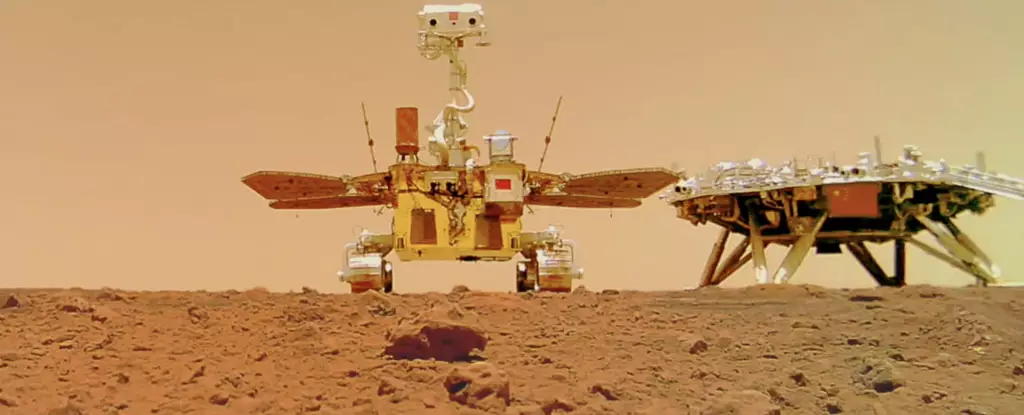Recent research led by China’s Zhurong rover has sparked renewed interest in the possibility that Mars was once home to a significant ocean. The findings, published in the journal Scientific Reports, provide intriguing new evidence that suggests the presence of ancient coastlines where water may have once flowed. This theory, which posits that up to a third of Mars was covered by ocean billions of years ago, has captivated scientists for decades, but remains a point of contention among researchers.
The Zhurong rover, which successfully landed in the northern hemisphere of Mars in 2021 within a region known as Utopia, has gathered a plethora of data during its explorations. Various surface features, including “pitted cones,” “polygonal troughs,” and “etched flows,” have been cataloged, all indicating a once-water-rich environment. Bo Wu, the leading author of the study from The Hong Kong Polytechnic University, articulated that these geological structures are suggestive of historical aquatic activity.
Surface features play a crucial role in reconstructing planetary histories. The existence of pitted cones, for instance, has previously been linked to the presence of mud volcanoes—usually signifying areas that were once saturated with water or ice. Additionally, satellite data combined with rover observations has led researchers to propose the existence of a once-prominent shoreline in Zhurong’s landing zone. According to the study, this hypothetical ocean is believed to have been formed approximately 3.7 billion years ago, later freezing over, thus carving out a coastline before retreating around 3.4 billion years ago.
These revelations offer a compelling narrative about Mars’s past, although Bo Wu exercised caution regarding the certainty of their findings. He emphasized that while the evidence is suggestive, it is far from definitive. To conclusively prove the existence of an ancient ocean, a sample collection mission would be necessary, one that could safely return Martian materials to Earth for advanced analyses.
Amidst these promising discoveries, scientific skepticism remains prevalent. Benjamin Cardenas, a researcher from Pennsylvania State University, has voiced concerns regarding the robustness of the current study’s claims. He argues that the effects of Martian winds over billions of years could have obscured or entirely eroded signs of a coastline, challenging the notion that such features can reliably indicate ancient water bodies. Cardenas’s skepticism calls attention to the dynamic nature of the Martian environment, often underestimated in comparisons to other celestial bodies like the Moon.
Despite this skepticism, Cardenas still leans toward the possibility of an ancient Martian ocean. He points to the broader implications of such a discovery—not solely for understanding Mars but for unraveling the mysteries of life beyond Earth. Many scientists suggest that the origins of life on our planet could be intimately linked to oceanic environments, where hot mineral-rich vents likely played a pivotal role.
The debate surrounding the existence of water on Mars is not merely an academic exercise; it holds significant implications for humanity’s understanding of life in the solar system. If Mars did indeed support an ocean, the findings could lead to essential revelations about the potential for life elsewhere and whether Earth is truly unique in its capability to harbor life.
The ongoing exploration of Mars, particularly through missions like that of the Zhurong rover, is essential to answering these pivotal questions. As technology continues to evolve, the potential for more sophisticated explorations grows—opening avenues for advanced geological surveys and sample-return missions.
Furthermore, the ongoing dialogue within the scientific community serves as a reminder of the complexity and dynamism in planetary science. Each mission, every sample, and the resulting analyses are steps toward piecing together the intricate history of Mars, while also informing our understanding of other planets. Only time, rigorous research, and well-planned missions will provide the clarity needed to determine if Mars truly was, or could once again be, a cradle for aquatic life.


Leave a Reply